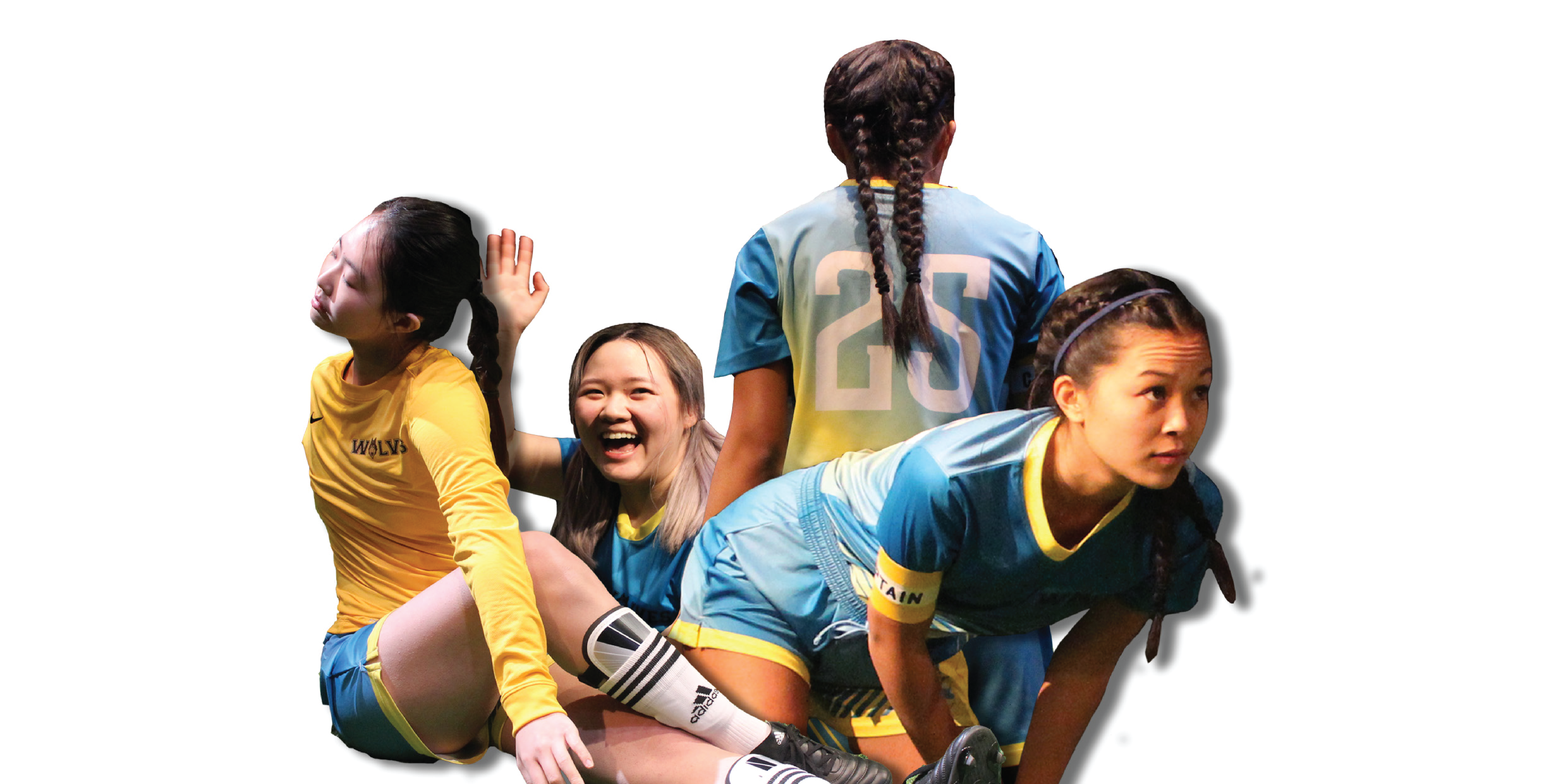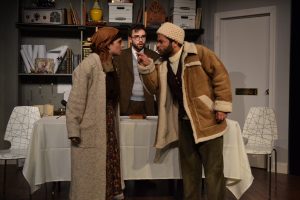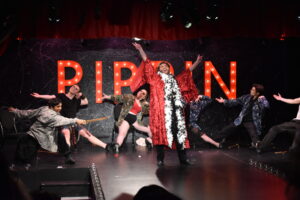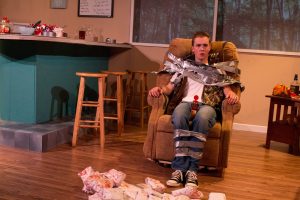“Quick hands! Quick hands!” The team captain, played by Bella Carlucci (COL ’23), yells to the goalie as the pair toss a soccer ball across the stage. Running past, the other players dribble soccer balls while chattering about concussions, weekend plans, and ghosts in their houses. In the intimate environment of the Village C Theatre, no barrier separates the audience from the turf-covered stage. Confronted with all the action and secrets a group of teen girls can harbor, audience members overhear each side-whisper and narrowly miss every stray ball. Because of this proximity, the audience feels as though they are part of the Wolves’s stretch circle.
The Wolves, written by Sarah DeLappe, tells the story of the titular high school women’s indoor soccer team grappling with relationship differences while coming to terms with their adulthood and the greater world around them. Nomadic Theatre produced the play in collaboration with the Black Theatre Ensemble, members of which worked on the production staff. From debating the legacy of the Khmer Rouge to facing pressure from college recruiters, The Wolves asks audiences to look deeper into the complicated lives of teenagers.
There is no lead in The Wolves. Each character is distinct, and the nine-person ensemble exchanges energy and attention throughout. The show’s bantering, easy tone is impressive considering many of the actresses are making their Georgetown theatre debuts. Grace Hermes (COL ’22), who played #11, was one performer who had never done theatre before.
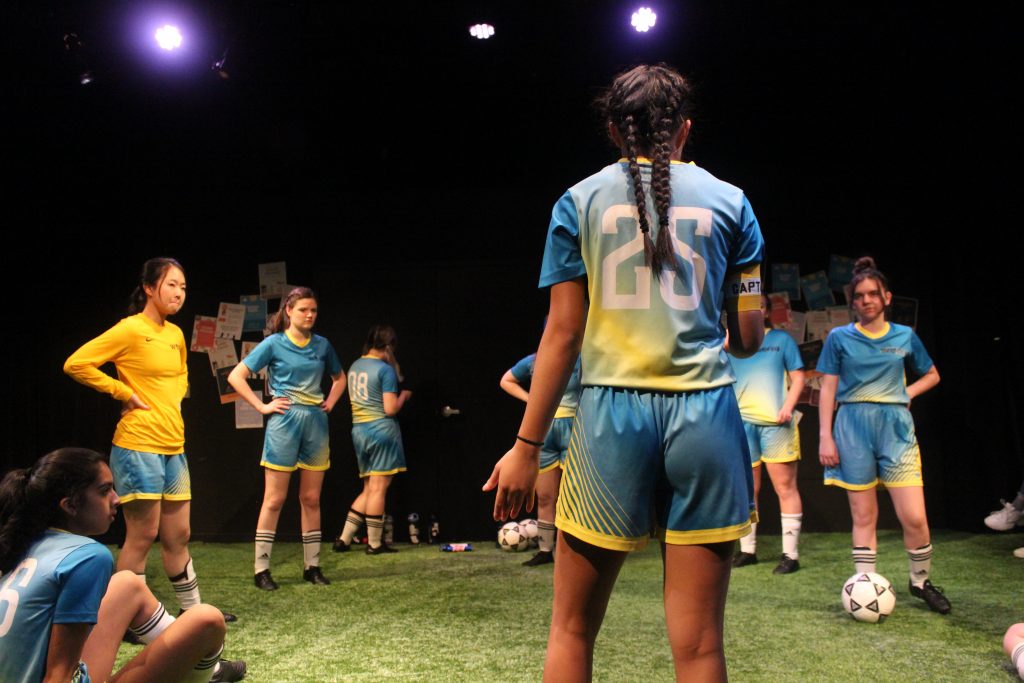 Nomadic Theatre
Nomadic Theatre
“I played soccer for like 10 years when I was little, that was my main thing. I lost all skill but I thought it would be fun to revisit it,” Hermes said. “It’s been a lot of fun playing a lot of soccer with Rachel here.” Rachel Thomas (COL ’22), #46, played soccer until her sophomore year of high school. Hermes called her a “baller,” which she shook off before begrudgingly accepting.
In addition to the show’s focus on women, the majority of the production staff is also female. “Something is different in the way [women] are socialized to communicate with each other, and it just makes collaboration a lot more organic and filled with kindness and wo
nderful to be around,” said the show’s director Jenni Loo (SFS ’21).
The Wolves does not try to glamorize women. Instead, it has universal themes and normalizes girls having regular conversations that don’t revolve around men. It is refreshing to see an intentional focus on girls portrayed realistically in a difficult stage of high school. Thomas praised the script. “The girls are really admirable; they’re smart, funny, take risks and they’re brave,” she said.
In addition to assembling an all-female cast, Loo intentionally encouraged women of color to audition for the cast and the crew. “I’m a person of color and previously I just felt that there aren’t as many opportunities for me in this theater community as there are for white actresses, and I want to be the change I want to see,” Loo said, noting that one of her goals for the production was “to make opportunities for people of color who might otherwise be typecast.”
The ensemble maintains the audience’s focus throughout, in part because of the sparse set, which is mostly repurposed turf from the Performing Arts Department and LubDub Theater’s November co-production of On the Lawn. For some crew members, however, envisioning such a bare set presented its own challenges.
“In the script, it says turf, no lines, no cones, so it can be kind of hard as a set designer to see something so simplistic,” the show’s producer Raphy Hupez (SFS ’21) said. The crew also finds ways to use props, like various cellphone models representing socio-economic status, to tell the story.
The characters don’t have names, just the numbers on their jerseys, but the cast created names for their characters and filled out worksheets to develop backstories. Carlucci shared that she created a playlist for her character, #25. “I always play it when I get in the mindset of my character so I’m like, ‘What would#25 do or think right now?’”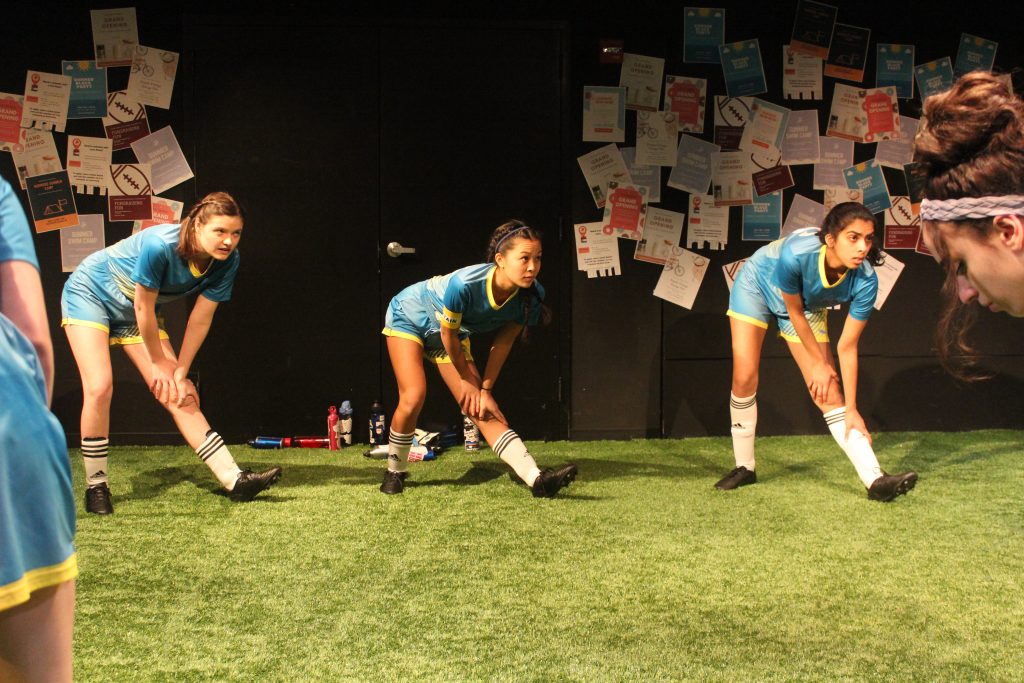 Nomadic Theatre
Nomadic Theatre
Despite the characters’ anonymity, the actresses easily convey individual quirks and personalities. Joy Kim (COL ’21), who plays #00, does a particularly moving job, with almost no lines, as her character suffers from severe anxiety before every game. She deftly conveys a broad range of emotions. In one standout scene, she empties a bag of soccer balls onto the darkened turf, her breathing heavy and mouth quivering. As she frantically chases down the balls, her face contorts until she is left sobbing in center stage.
The dialogue can be stilted at times. In one scene, #00 says, “I noodle around on the sax.” The sentiment is confusing and unnatural, but to no fault of Kim—there’s no saving a line so forced. Overall, though, such quips evolve into more substantive interactions. Because the girls talk in overlapping conversations,it presents a choose-your-own-adventure of which dialogue to follow. The play feels like eavesdropping on a private conversation.
Most scenes depict the entire team together, with snappy conversation accompanying their quick movements—creating a sense of tense, pre-game excitement. While the concept is fast paced and innovative, the execution can be overwhelming and awkward at times. Many of the show’s most revealing moments, however, result from scenes where only parts of the team remain onstage. #00 says some of her first words to #46 when they are left alone after warmups. #07 makes plans for a boozy birthday getaway with #14 when they would normally celebrate with the team, reflecting their supposed maturity.
When a new player, #46 (Thomas), joins the team, they have reservations about her origins, perceived odor, and lack of indoor soccer experience. Thomas manages to command sympathy while providing comic relief in her role. Her character, the awkward new girl, must endure feeling likean outsider amidst a close-knit pack. Many in the team defend her ostracization by emphasizing the team’s long shared history. However, #46 is also clearly a victim of their ingrained xenophobia. After the others repeatedly refuse to learn what a yurt is, Thomas’s delivery of the chant, “I live in a yogurt, my feelings don’t get hurt,” is at once hilarious and devastating.
While the team in The Wolves is not supposed to represent a microcosm of modern American teenhood, its members certainly respond to curre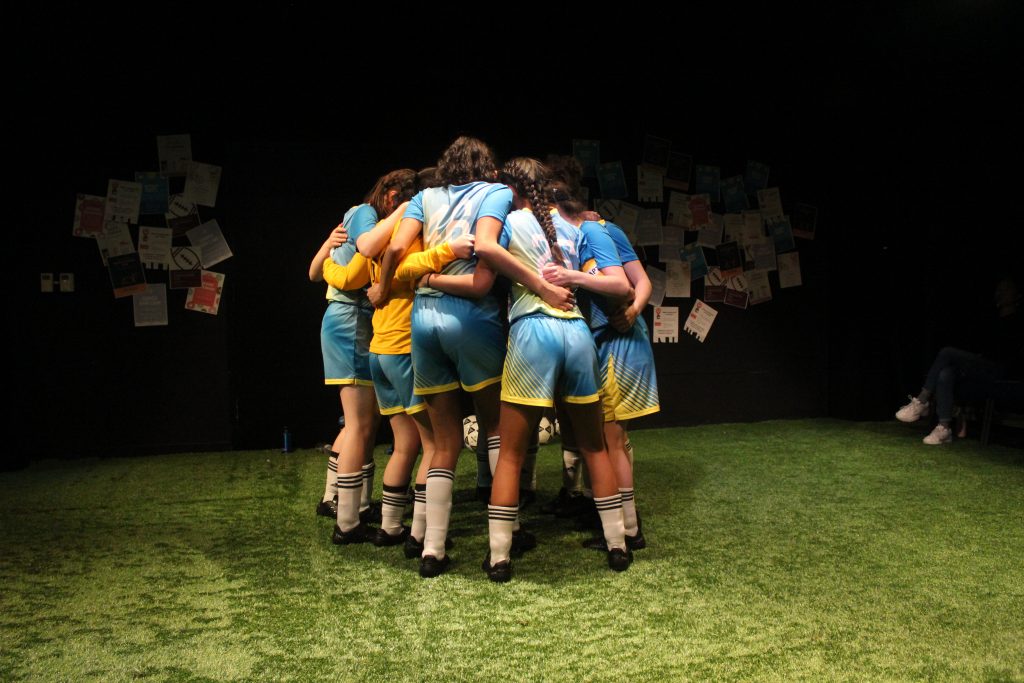 Nomadic Theatrent political happenings and embrace contemporary cultural sentiments. The players may discuss the border crisis in a well-meaning (yet undeniably removed)manner, but they grapple with sexuality, abortion, and anxiety firsthand.
Nomadic Theatrent political happenings and embrace contemporary cultural sentiments. The players may discuss the border crisis in a well-meaning (yet undeniably removed)manner, but they grapple with sexuality, abortion, and anxiety firsthand.
The last scene is one of the longest and also contains the least amount of action. The pace slows drastically, to fantastic effect. Recovering from a tragedy, members of the team filter in one-by-one, each arriving to sit on the turf rather than launching right into warmups. The actors embrace the silence and stillness, gradually becoming chattier but still maintaining the weight of the situation through careful pauses and measured bursts of emotion.
Ultimately, The Wolves is about differences, and how we can reconcile with them. These characters each have individual problems and backgrounds, but they all want to win. “We are all better for talking to each other and actually bridging those differences,” Loo said. “That’s kind of what soccer does in this play.”
The Wolves will run through Feb. 1 at the Village C Theatre.


